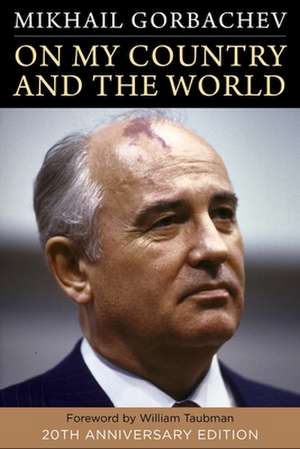On My Country and the World – 20th Anniversary Edition
Autor Mikhail Gorbachev, William Taubmanen Limba Engleză Paperback – 16 ian 2020
| Toate formatele și edițiile | Preț | Express |
|---|---|---|
| Paperback (1) | 121.49 lei 3-5 săpt. | +17.75 lei 5-11 zile |
| Columbia University Press – 16 ian 2020 | 121.49 lei 3-5 săpt. | +17.75 lei 5-11 zile |
| Hardback (1) | 472.05 lei 6-8 săpt. | |
| Columbia University Press – 25 noi 2019 | 472.05 lei 6-8 săpt. |
Preț: 121.49 lei
Nou
Puncte Express: 182
Preț estimativ în valută:
23.25€ • 25.27$ • 19.55£
23.25€ • 25.27$ • 19.55£
Carte disponibilă
Livrare economică 31 martie-14 aprilie
Livrare express 15-21 martie pentru 27.74 lei
Preluare comenzi: 021 569.72.76
Specificații
ISBN-13: 9780231194891
ISBN-10: 0231194897
Pagini: 320
Dimensiuni: 153 x 227 x 21 mm
Greutate: 0.43 kg
Editura: Columbia University Press
ISBN-10: 0231194897
Pagini: 320
Dimensiuni: 153 x 227 x 21 mm
Greutate: 0.43 kg
Editura: Columbia University Press
Notă biografică
Cuprins
Foreword to the Twentieth Anniversary Edition, by William Taubman
Part I: The October Revolution: Its Sense and Significance
1. A Blunder of History, Accident, or Necessity?
2. Was Socialism Built in the Soviet Union?
3. Let¿s Not Oversimplify! A Balance Sheet of the Soviet Years
4. October and the World
5. One More Balance Sheet: Something Worth Thinking About
6. October and Perestroika
7. Does Socialism Have a Future?
8. Summing Up
Part II: The Union Could Have Been Preserved
9. A Tragic Turn of Events
10. Tbilisi . . . Baku . . . Vilnius
11. Toward a New Union Treaty
12. Referendum on the Union
13. The Coup: A Stab in the Back¿and the Intrigues of Yeltsin
14. The Belovezh Accord: Dissolution of the USSR
15. What Lies Ahead?
Part III: The New Thinking: Yesterday, Today, and Tomorrow
16. The Sources of the New Thinking
17. The Very First Steps
18. The Conception (1985¿1991)
19. Overcoming the Cold War
20. The Transitional World Order
21. The New Thinking in the Post-Confrontational World
22. The Challenge of Globalization
23. The Challenge of Diversity
24. The Challenge of Global Problems
25. The Challenge of Power Politics
26. The Challenge of Democracy
27. The Challenge of Universal Human Values
28. The Beginning of History?
Index
Part I: The October Revolution: Its Sense and Significance
1. A Blunder of History, Accident, or Necessity?
2. Was Socialism Built in the Soviet Union?
3. Let¿s Not Oversimplify! A Balance Sheet of the Soviet Years
4. October and the World
5. One More Balance Sheet: Something Worth Thinking About
6. October and Perestroika
7. Does Socialism Have a Future?
8. Summing Up
Part II: The Union Could Have Been Preserved
9. A Tragic Turn of Events
10. Tbilisi . . . Baku . . . Vilnius
11. Toward a New Union Treaty
12. Referendum on the Union
13. The Coup: A Stab in the Back¿and the Intrigues of Yeltsin
14. The Belovezh Accord: Dissolution of the USSR
15. What Lies Ahead?
Part III: The New Thinking: Yesterday, Today, and Tomorrow
16. The Sources of the New Thinking
17. The Very First Steps
18. The Conception (1985¿1991)
19. Overcoming the Cold War
20. The Transitional World Order
21. The New Thinking in the Post-Confrontational World
22. The Challenge of Globalization
23. The Challenge of Diversity
24. The Challenge of Global Problems
25. The Challenge of Power Politics
26. The Challenge of Democracy
27. The Challenge of Universal Human Values
28. The Beginning of History?
Index
Descriere
Descriere de la o altă ediție sau format:
Drawing on his own experience, rich archival material, and a keen sense of history and politics, Mikhail Gorbachev speaks his mind on a range of subjects concerning Russia's past, present, and future place in the world. Here is Gorbachev on the October Revolution, the Cold War, and key figures such as Lenin, Stalin, and Yeltsin.
Drawing on his own experience, rich archival material, and a keen sense of history and politics, Mikhail Gorbachev speaks his mind on a range of subjects concerning Russia's past, present, and future place in the world. Here is Gorbachev on the October Revolution, the Cold War, and key figures such as Lenin, Stalin, and Yeltsin.
